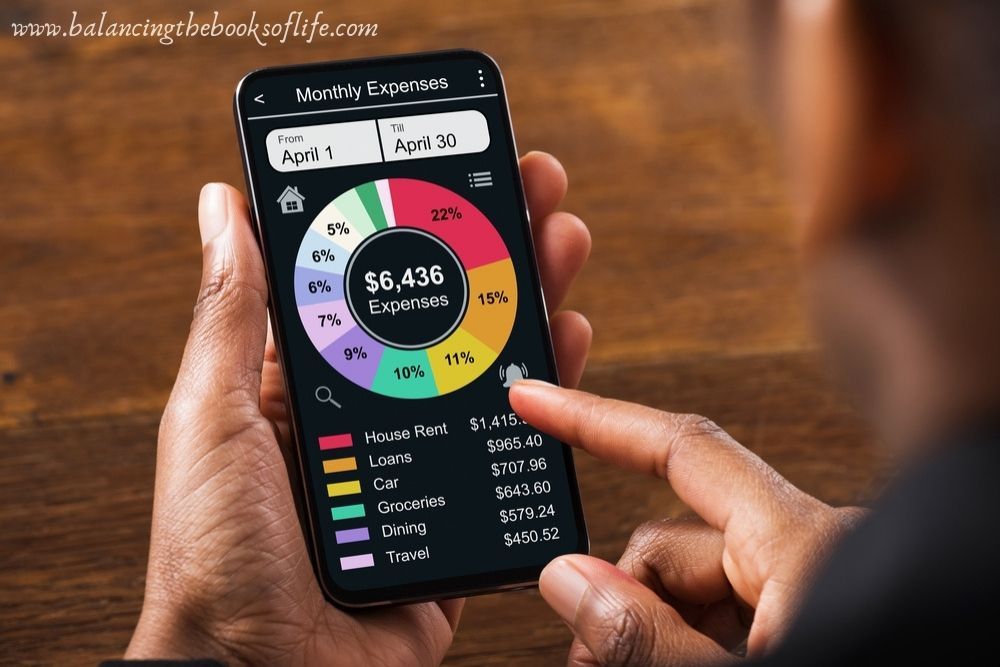
The idea of taking control of your finances when, often times, your money situations have been avoided or ignored for so long can be incredibly overwhelming. You want to get more on top of your money and control your finances, but you aren’t exactly sure where to start. Maybe you’re behind on the bills, and don’t want to face the debt. Perhaps you’ve been just scraping by, paying all the bills, but slowly letting credit card debt increase, or at the very least not saving money. Or you are saving money, but are careless and know you can do better. You know you have goals, but aren’t sure what the first step is to reaching them. The first step, my friend, is to track monthly expenses.
Why should you track monthly expenses?
The fact that you are reading this page means you are interested in taking control of your finances. If I were to ask you how you knew all your bills were paid every month, what would you tell me? What if I asked you how you knew you had enough money to pay those bills? We all have, as you are well aware, expenses that are required of us. Usually these are monthly, but sometimes they are more, or less, frequent. Most bills are predictable, like a mortgage or rent, coming at the same time and amount, every month. And we all, with some amount of confidence, are able to pay those bills. But how? Where does that confidence come from?
Having control over your finances comes from understanding your income, and your spending. It comes from having some knowledge on how much money is passing through your hands, or your bank account. Some amount of money is coming in. It is important to know how much money there is to work with in a given time frame. This is even more important if your income is unpredictable. For instance, if you work for yourself, or get paid off commission. Likewise, some amount of money is leaving, hopefully less than is coming in.
If you are struggling to pay your rent, you may not realize that your daily Starbucks addiction is the reason behind that. Tracking your monthly spending will help you see those trends and understand where your money is going. It will allow you to familiarize yourself with regular spending habits, and give you knowledge and power to make sure what you spend your money on is what you want to be spending your money on.
Related reading: How to Calculate Your Net Worth
But how do you track monthly expenses?
Ultimately, the secret for how to improve your finances, or how to control spending habits, lies in an expense tracker. There are several tools out there that will enable you to help control finances by accurately track monthly expenses and spending. All have their own sets of pros and cons, and in the end, it is really up to you as to which one fits your style and feels easiest to use.

Free tools to track monthly expenses
1.Old fashioned notebook and pen. This is honestly one of my favorite methods of tracking expenses, because it forces you to really think about and recognize that the expense is happening.
2. Home-made spreadsheets via Excel or Google Sheets. This can be nice, especially in Excel, for people who are wary of having their information online. It also requires hand entry and forces mindfulness in spending.
3. Mint. Highly popular, Mint can provide budgeting and forecasting, and is very excelled at telling you where your money went.
4. Personal Capital. This is my favorite site for investors and seeing a vision for long term money growth.
Tools with free and paid versions
5. Every Dollar. Every Dollar follows Dave Ramsey’s Total Money Makeover steps. The base version is free, but there is a monthly fee to upgrade to the version that will sync to your accounts.
6. Good Budget. Tries to emulate the cash envelope budgeting method. With the free version you can only link one account.
7. Hurdlr. Good option for people who are self-employed, independent contractors and side hustlers. It will estimate taxes and keeps track of mileage.
8. Pocketguard. Very simple app that focuses on what you have spent and on what.
9. Wally. Wally is similar to Pocketguard where is focusing on tracking the money coming in and the money going out, but less concerned with analytics and graphs.
10. Clarity Money. Clarity Money is a budgeting app that also allows you to cancel subscriptions, and will negotiate lower bills. It is free to use the app, but there is a one-time fee if they succeed at lowering a bill.

Paid tools to track monthly expenses
11. You Need A Budget (YNAB). Similar to the cash envelope system, YNAB allows you to make a plan for where the money currently in your account will go. It promotes getting out of the paycheck to paycheck lifestyle and having a month’s expenses upfront in your account to remove all sense of forecasting potential income and only looks at money that is already there. There is a free trial.
12. Trail Wallet. Designed with adventurers in mind, this is an app only tool that will help you budget your vacation and travels, in addition to everyday life. The first 25 items are free. https://voyagetravelapps.com/trail-wallet/
13. Quicken/Quickbooks. This is great for a small business.
14. Mvelopes. Mvelopes is similar to Good Budget and YNAB in that it brings the envelope system virtual. It has great live support.
15. Calendar Budget. A unique form of personal finance and budgeting in calendar form.
Related reading: Tips to Avoid Impulse Spending
It IS possible to gain financial control
Regardless of where you are at financially, if you aren’t used to it, tracking monthly expenses can be incredibly overwhelming. There is no one size fits all app or website to track monthly expenses. While they all work, you will find you have your own preferences. If one isn’t working for you and you don’t like the way it functions, try a different one. I did a combination of paper and pen and spreadsheets for a long time. Then, for awhile I used Mint. Currently, I use Personal Capital for investing and YNAB for budgeting. It just becomes a matter of preference.
Remember, the tool does not make the habit. The tool provides convenience for the habit. In the end it is not the tool, but your brain and your desire for change that will create the habit to track monthly expenses and finally gain financial control. Before you sign up for any of these tools, turn inside and look at your thoughts, your desires to control finances, and your priorities around your time and your money. Make sure that it is something that you are really dedicated to. Understanding your monthly expenses by using an expense tracker is the first step to taking control of your finances. Once you know where your money is going, you have complete power and ability to change it and align it your goals.
Related reading: How to save money with Buy Nothing Facebook Groups
Related reading: How to determine if an expense is worth it


Michele is the fun-loving, easy going, project managing, financial savvy author behind the Balancing the Books of Life blog. She invites other moms to come along her journey to both become financially independent and spend time on things they love!


Leave a Reply